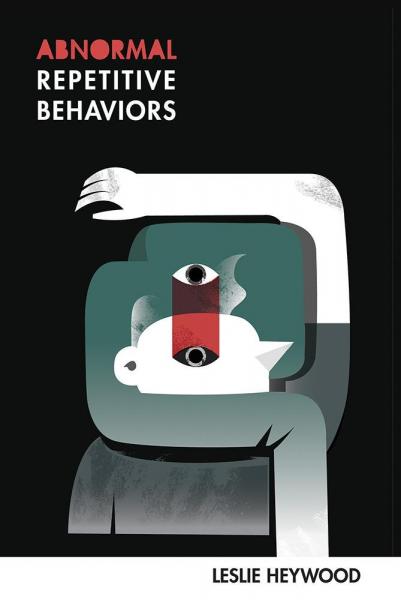A Review of "Abnormal Repetitive Behaviors" by Leslie Heywood

Abnormal Repetitive Behaviors by Leslie Heywood, Red Hen Press, 2016, 100p, paper, $11.95.
Abnormal Repetitive Behaviors, Leslie Heywood’s third collection of poetry, is nothing near repetitive. With narrative lyricism that shines off the shields of Greek warriors, Heywood hunts for the battles fought in childhood. In her titular prologue poem the concept of abnormal repetitive behaviors is introduced though Rilke’s panther, a caged wolf, carving the same path across the enclosure, where “Beyond the bars, or whatever takes / The place of bars, no world.” The collection is opened by this warning and haunted by the behavior’s presence in a place where mythological beings are strapped to “Mechanicville.” Whispered across three sections, the family tragedy of generational fallout following the murder-suicide of the author’s grandparents, and the grappling involved in this emotionally and physically charged atmosphere. Ultimately, the collection is a circling of the relationship of the author to her father, a man defined by the violence of his own childhood.
Heywood, scholar of neurobiology, emotion, and the effect of exercise on these, shows us just how far she is willing to chase the turbulence and silence of her home. The author’s heart outrunning endlessly a tragedy that can’t be outrun, “my magic heart, my trick organ / That could behave as if fighting for its life / For such long intervals of time.” Positioned as protector in the first section of the collection, our first hero is born, a hero torn between recognizing her father’s ability to be monstrous, “a whirl of fist inarticulate at this point like the raving Ajax,” and reconciling this with her unabashed adoration of him: “I am the daughter who followed you around / Like I was the earth tracking your sun, / How tall you were, the great wall of your back / Like you could hold me and all the rest / Of the world overhead.”
When Heywood’s father effectively disappears, the second section is opened and Heywood soaks poems in the aridness of the desert, her father’s desertion and abandonment spelled by heat and dry air, “dragon’s breath.” Chollas appear and assert themselves across this section, spiked cacti that repetitively reflect the nature of a cutting loss. The third section, a delineation of grief, breaks from the mythological and becomes salve for the wounds accumulated. Heywood has brought the reader to the present, to miscarriages of the heart and body, and reconciles her father’s heroic monstrosity in an ode to his graveside buried deep in the mountains. Her fierce loyalty retained, her father’s ashes are scattered on the mountainside, “A place, he explained to me, / Where the light falls all day, / Bright shaft through the canopy of trees.” Heywood has brought the narrative full circle in her focus on the generational effects of trauma, ending with poems focused on her own motherhood and dreams for her daughters, recognizing finally a transcendence of grief. “There is a magic in the way / She moves her hands, a grace of fingers, / And the way she smiles and speaks. / How did this perfect creature come from me, / How did she end up this strong, / This generous, this whole, I am thinking,” four decades of tragedy finally rewritten.
Recommended
Nor’easter
Post-Op Appointment With My Father
Cedar Valley Youth Poet Laureate | Fall 2024 Workshop





